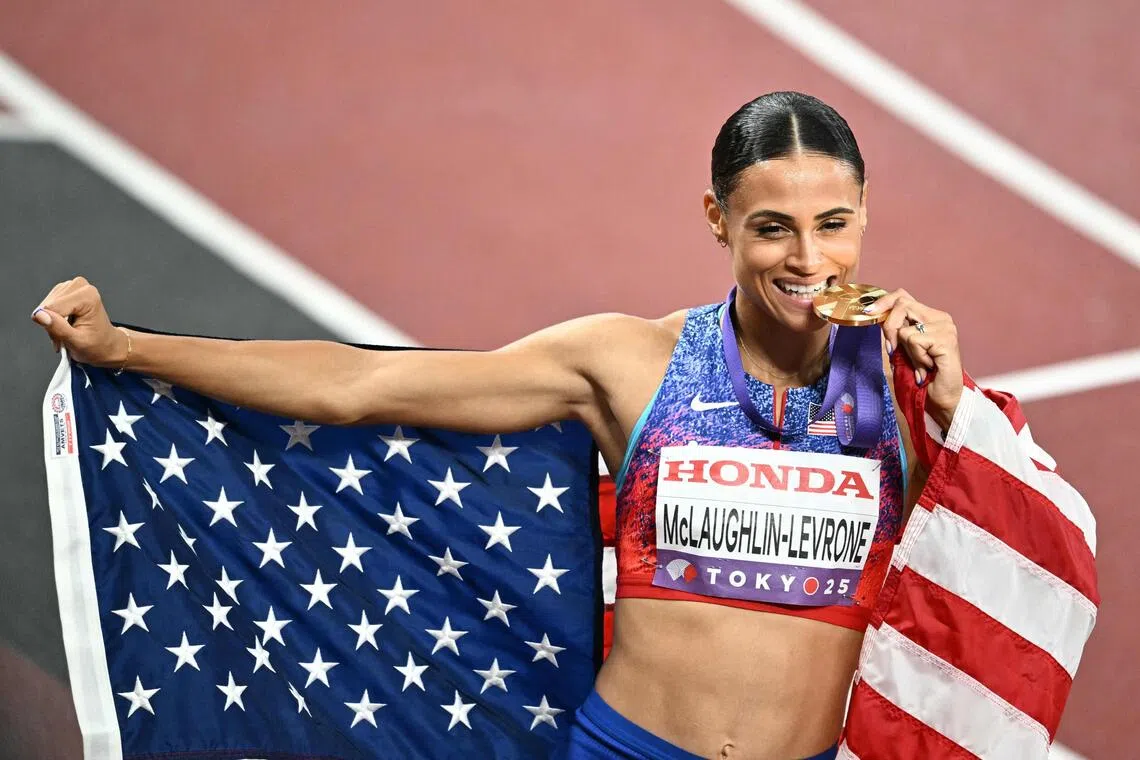Sydney McLaughlin-Levrone powers to 400m world championship gold in second-fastest time ever
Sign up now: Get ST's newsletters delivered to your inbox

American Sydney McLaughlin-Levrone claimed world championship gold in 47.78 seconds on Sept 18.
PHOTO: AFP
Follow topic:
TOKYO – Sydney McLaughlin-Levrone ran the fastest women’s 400m in 40 years to claim world championship gold in 47.78 seconds on Sept 18 and complete her transition from the one-lap hurdles in emphatic style.
The American stormed through the Tokyo rain and held off Olympic champion Marileidy Paulino in a sprint to the line to add a first global gold in the flat 400m to the two Olympic and one world titles she won over the hurdles.
Only Marita Koch has run faster in the event, the East German setting the world record of 47.60sec in 1985 under the shadow of the Cold War nation’s systematic doping programme.
“It’s amazing, it’s an honour,” said McLaughlin-Levrone at the Japan National Stadium.
“I knew there were a lot of people doubting me with making the switch from 400m hurdles to the flat 400m, but ultimately... I knew I had it in me. It was just a matter of time.
“We will need to talk about the schedule for the Los Angeles 2028 Olympic Games. Maybe I could do both 400m and 400m hurdles?”
McLaughlin-Levrone, who broke the world record to win Olympic gold over the hurdles in 2024, made the switch to the flat this season and went into the final as favourite after breaking the American record with a run of 48.29sec in the semi-finals.
“At the end of the day, this wasn’t my title to hold on to, it was mine to gain,” she said.
Paulino, who was defending the title she won in 2023, will take a silver medal back to the Dominican Republic after finishing second in 47.98sec and becoming the third-fastest woman of all time.
Bahrain’s Nigerian-born former world champion Salwa Eid Naser, who served a two-year ban for a doping infraction from 2021 to 2023, took bronze in 48.19sec.
She said: “I’m a bit disappointed. Look at the results of our final. They say that I have to work harder. I think that very soon the women’s 400m world record will be broken.”
In the men’s 400m event, Botswana’s 21-year-old Busang Collen Kebinatshipi won gold, roaring clear in 43.53sec, with compatriot Bayapo Ndori taking bronze on a memorable night for the African nation.
Jereem Richards of Trinidad and Tobago took silver with a 43.72sec national record, with Ndori third in 44.20.
Cuba’s Leyanis Perez Hernandez denied Venezuela’s Yulimar Rojas a record-extending fifth successive world title when she won the women’s triple jump.
Olympic champion Thea LaFond of Dominica won the silver with 14.89m, while Rojas, in her first competition for two years because of injury, had to be content with bronze with 14.76m.
Trinidad and Tobago’s Keshorn Walcott, 32, clinched his first global title since he claimed Olympic gold as a teenager in 2012 when he won the men’s javelin final with a throw of 88.16m.
Grenada’s Anderson Peters finished second with a throw of 87.38m, while the bronze went to American Curtis Thompson (86.67m).
Off the track, David Howden, chairman of the Athletics Integrity Unit (AIU), says his organisation’s anti-doping work is having a tangible impact on the sport and the evidence is to be seen in the wider range of countries winning medals at the world championships.
The AIU was set up as an independent arm of World Athletics in 2017 following the Russian doping scandal and is seen by many as the benchmark across all sport for fighting the use of performance-enhancing drugs.
After his victory in the 10,000m final on Sept 14, Frenchman Jimmy Gressier – the second-ever non-Africa-born winner of the event and first since 1983 said; “Today I beat East Africa. The AIU is doing a huge job and it helps to level the playing field a bit more.”
Asked on Sept 18 about the comments, Howden said the appreciation went both ways.
“That’s really gratifying to hear that athletes are appreciating what we’re doing,” he told a press conference in Tokyo.
“That’s what we’re here for, to get the people who are intentionally defrauding other athletes out of podium positions, out of money, out of sponsorships, out of enjoying the moment when they succeed,” added Howden.
“I think one way you could look at that is how many people from countries that haven’t won medals before are now winning medals? How many people are winning gold medals where they have not won gold medals for 50 years? How many people are making finals?”
Meanwhile, former Colombian sprinter Ximena Restrepo has told AFP in an interview that she intends to stand to succeed Sebastian Coe and become the first woman to lead World Athletics.
Restrepo, 56, said on the sidelines of the world championships that she would be a candidate to succeed the Briton when the time comes.
“I’m going to run for president. It won’t be easy. I already know there are two other candidates who are going to run and who are very good, but it would be something I’d like to do,” she said.
REUTERS, AFP

